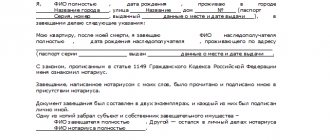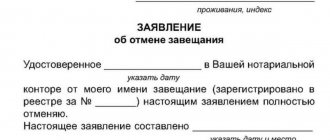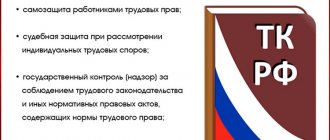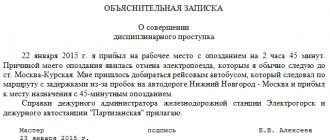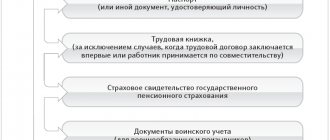The concept of a will in emergency circumstances
The rules of civil law stipulate that a will must be drawn up in a certain form and certified by a notary or persons who, in certain cases, can be equated to a notary.
For persons who cannot come to the notary themselves, a home visit is provided, and for those who cannot write on their own, an executor is invited, however, the notary (or persons equivalent to him) must be present when drawing up a will. Otherwise, the testamentary document will be invalid. There is an exception to this rule - a will in emergency circumstances.
The provisions of Art. 1129 of the Civil Code of the Russian Federation, in exceptional circumstances in which a citizen, due to special reasons, cannot come to a notary’s office and record his last will regarding his property, it is permissible to draw up a testamentary document in simple written form.
What is this - a will made in emergency circumstances?
Attention: A person’s expression of will, made under conditions of a mortal threat and which does not allow under certain conditions to use notary services (Articles 1124, 1125, 1126, 1127, 1128 of the Civil Code of the Russian Federation) is considered a will in emergency circumstances.
This is legally enshrined in the Civil Code of the Russian Federation, Art. 1129. Ch. 62.
- The first paragraph of this article provides an explanation of how to correctly draw up a document.
- The second specifies the conditions and reasons under which a will may lose its legal force.
- The third stipulates the requirements to fulfill the wishes of the testator.
In what cases is it valid?
A will is considered valid if:
- a person is in an emergency situation and his life is at risk;
- the document is in writing;
- the citizen wrote it himself and certified it with his signature;
- two witnesses were present when the paper was written;
- the testator familiarized the witnesses with the contents of his expression of will.
However, each of these provisions can be challenged.
It is difficult to imagine such emergency circumstances in which a person will think about his last will, and not about how to save his life. Usually, in extreme situations, all forces are mobilized to find a way out of the current situation.
Extraordinary circumstances are considered such because they occur suddenly.
What and on what can you write in this case? Whom should I ask to witness what is written? Is there a guarantee that the written paper will be preserved and passed on to the heirs?
Reference: Order of the Ministry of Internal Affairs of the Russian Federation No. 363 dated March 24, 2015 provides clarifications on what specific circumstances are considered emergencies - these are man-made, military circumstances, terrorist attacks, environmental disasters, natural disasters.
Emergency Will Form
A will that is drawn up in conditions other than normal cannot have a clearly established standard or pattern. Because often if the testator is in real danger, there is no time left to search for a template. The form of drawing up such a document is significantly simplified, but a number of requirements for it remain the same.
The main condition for recognizing a will drawn up in such circumstances as valid is to reflect the will of the testator. The document must be drawn up in such a way that it is possible to read and understand its contents, and, if necessary, confirm its accuracy.
It must be clear from the contents of the document that it is a will.
When forming such a document, it is advisable to make reference in the text to the circumstances that prompted its preparation in these circumstances.
This will help the heirs, who will prove the authenticity of this document, to navigate the collection of evidence.
The period during which a will made in emergency circumstances is valid
Clause 2 of Art. 1129 of the Civil Code of the Russian Federation determines the maximum period given to the testator to make a will in accordance with Articles 1124 - 1128 of the Civil Code of the Russian Federation. If, within a month after the cessation of emergency circumstances, a citizen does not contact a notary or a person entitled to perform the relevant notarial actions, the will loses legal force .
It should be noted that the month period is counted from the date of termination of the emergency, and not from the date of drawing up the document.
Example
A group of tourists fell under a rubble in the mountains, as a result of which one of them received serious injuries and was unable to be transported. Since there was no radio communication, it took several days to reach the nearest populated area. During this time, which was required by two tourists, the victim died, despite the assistance provided to him by a doctor in the group.
The deceased managed to draw up a will on paper, which was certified by members of his group. A week after the incident, the will was delivered to the notary, who used it in an open inheritance case. Available witnesses confirmed the fact that the will was drawn up in emergency circumstances, when it was not possible to contact a notary.
When a will made in emergency circumstances becomes invalid
If, after the special circumstances in which the testator found himself, ceased, and at the same time he survived, he must confirm his will within a month in the manner prescribed by law.
That is, having left the zone of disaster, accident or military action and finding himself in conditions where his life is not in danger, the testator must contact a notary and draw up a new wonderful document that will confirm or refute the will in emergency circumstances.
If this is not done, the will will become invalid. Such a will will not be accepted for consideration, and it will be very easy to revoke it in court. In this case, his property will pass to his heirs according to law, without taking into account the document drawn up in emergency circumstances.
The one-month period during which the testator must confirm his will cannot be restored.
But if, after this period, the testator is not able to certify the testamentary document, for example, he is in a coma, that is, the danger to his life continues to persist, the period will begin only after he emerges from the coma.
If a citizen has drawn up a will, but, having found himself in emergency circumstances, has changed his will, the new document will apply only to those provisions that are duplicated by the notarized will. Those points that are not covered by the new document will be executed in accordance with the previously drawn up testamentary document.
Making a Will in Emergency Circumstances
There are a lot of situations that can be considered emergency circumstances. They can be divided into several categories:
- armed clashes;
- man-made accidents;
- sudden illnesses, which may result in death, while the testator is in a remote area with limited access;
- natural disasters;
- other emergency circumstances.
In order for a document drawn up under special circumstances to have the form of a will and to avoid problems in its execution, the following conditions must be met:
- the situation in which the citizen finds himself must threaten his life;
- the circumstances that threatened the life of the testator must be extraordinary;
- the prevailing special circumstances must prevent the will from being made in the manner established by the Civil Code of the Russian Federation and having it notarized;
- the document must be drawn up personally by the testator and reflect his will;
- when drawing up the document there must be at least two witnesses;
- the will set forth in the document must affect the property belonging to the testator;
- extraordinary circumstances that prevented the drawing up of a will must not cease until the death of the testator.
If these conditions are not met, a will made in emergency circumstances becomes invalid.
How to Write a Will in Emergency Circumstances
There is no strict procedure for making this type of will. It is enough to complete the following points:
- Put your post-mortem instructions in writing (there are no instructions regarding the medium).
- Put a personal signature under the text.
- Give it to witnesses to sign.
At this point, the process of expression of will can be considered complete. The rules for drafting are simple, but they must be followed very precisely, taking into account the conditions that guarantee the legal validity of such a will.
Conditions of validity
A declaration of will expressed in emergency circumstances can become the basis for inheritance only if the following conditions are met:
- The testator has not previously made a will in an official form.
- The document could not be drawn up in any other form due to objectively insurmountable obstacles.
- The text of the will was written and signed by the testator himself.
- The presentation of the last will took place in the presence of at least two witnesses, who affixed the document with their signatures after the testator.
- The witnesses present were: literate, capable, sober, disinterested in the subject of the will and clearly understanding the essence of what was happening.
- The testator was of sound mind, sound memory and a state of full legal capacity (over 18 years old or an emancipated teenager 16–18 years old).
- The last will of the testator, written by him in emergency circumstances, was officially confirmed by him within a month or established in court by interested parties (in the event of his death earlier).
Making a will in emergency circumstances
The law also establishes special requirements for the procedure for drawing up a testamentary document, failure to comply with which leads to invalidity.
When drawing up a will, at least two witnesses must be present; the law does not stipulate a maximum number of witnesses. The more of them there are, the easier it will be for the heirs to prove the fact of its preparation. Accordingly, a will drawn up in the presence of one witness will not be recognized as valid.
The law also puts forward certain requirements for witnesses, who must be present when drawing up a will and subsequently confirm the fact of its drawing up and the circumstances under which it was made. The following cannot be witnesses:
- a notary or persons equated to them by law;
- heirs;
- incompetent and illiterate citizens;
- who do not speak the language of making a will.
If these requirements are not met, the inheritance will be carried out according to law.
Thus, when drawing up a will, it is advisable to indicate in its text the fact of the presence of witnesses and reflect their personal data.
How to Make a Will in Emergency Circumstances
Despite the absence of a will form, a citizen must follow the rules established by law for the preparation of documents of this kind.
It is important to include the necessary information. There are some considerations for making a will in emergency circumstances. Witnesses who are present at the time of preparation of the document must be legally competent persons.
The following cannot be accepted as witnesses:
- notary, citizens equal to him;
- the heirs themselves;
- illiterate persons;
- citizens who do not speak the language in which the will is drawn up.
Sample
You can use the following sample to draw up a document.
The will must stipulate:
- date and place of document preparation;
- information about the person transferring the inheritance (full name, passport details, registration address, contacts);
- data of citizens to whom property is transferred by will (full name, passport details, contact and address information);
- information about the transferred property (detailed characteristics, location);
- information about witnesses present at the time of drawing up the will;
- testator's signature.
Drawing up a will during an emergency or in emergency circumstances does not require that the document be drawn up briefly. It is necessary to describe the current situation in as much detail as possible so that it will be easier for the heirs to later prove their right to accept the property.
Download a sample will in emergency circumstances
When a will made in emergency circumstances becomes invalid
If, after the special circumstances in which the testator found himself, ceased, and at the same time he survived, he must confirm his will within a month in the manner prescribed by law.
That is, having left the zone of disaster, accident or military action and finding himself in conditions where his life is not in danger, the testator must contact a notary and draw up a new wonderful document that will confirm or refute the will in emergency circumstances.
If this is not done, the will will become invalid. Such a will will not be accepted for consideration, and it will be very easy to revoke it in court. In this case, his property will pass to his heirs according to law, without taking into account the document drawn up in emergency circumstances.
The one-month period during which the testator must confirm his will cannot be restored.
But if, after this period, the testator is not able to certify the testamentary document, for example, he is in a coma, that is, the danger to his life continues to persist, the period will begin only after he emerges from the coma.
If a citizen has drawn up a will, but, having found himself in emergency circumstances, has changed his will, the new document will apply only to those provisions that are duplicated by the notarized will. Those points that are not covered by the new document will be executed in accordance with the previously drawn up testamentary document.
Form and procedure for making a will in emergency circumstances
Compared to other forms of will, a document drawn up in accordance with Art. 1129 of the Civil Code of the Russian Federation, has a simplified form and can be certified by any legally competent person , and not just a notary. There are several requirements for such a document.
- Finding the testator in conditions that create an immediate threat to his life. He should also be deprived of the opportunity to contact a representative of a notary body to make a will in any other form. Thus, being in an emergency situation does not become an exhaustive condition for drawing up a will in a simplified form.
- According to paragraph 1 of Art. 1129 of the Civil Code of the Russian Federation, a citizen must fill out and sign the document with his own hand . Russian legislation does not recognize as valid a document drawn up using technical means (typewriter, etc.). At the same time, there are no prohibitions on the use of specific materials when drawing up a will. Thus, it can be written down not only on paper, but also on other materials available to the person compiling it.
- The signing of the document must be witnessed by at least two persons . At the same time, the need for them to perform any actions is not stipulated - for example, signing a document or an envelope in which it can be sealed.
- If the testator remains alive, within a month he must contact a notary to make a will in a form convenient for him. If the testator died within a month after the cessation of emergency circumstances , confirmation of the legality of the document drawn up by him is determined by the court .
Execution of a will in emergency circumstances
In order for a will made under conditions other than usual to be executed, its validity must be confirmed by a court. In addition, the interested person must go to court before the period allotted by law for accepting the inheritance has expired.
That is, the heir who is indicated in the will within 6 months after the death of the testator must go to court and prove the validity of the testamentary document. Only on the basis of a court decision that has entered into force will the notary issue a certificate of inheritance.
Drawing up an order in emergency circumstances
The main difference between a notarized will and an order made in emergency circumstances is the method of authentication. Drawing up a will without a notary in accordance with Art. 1127 of the Civil Code of the Russian Federation is carried out in the presence of the head physician of the hospital, the captain of the ship or the head of the prison or other authorized person.
In emergency circumstances this option is usually not available. Therefore, the legislator has provided an alternative way of drawing up a will. It is enough for the testator to write the order in simple written form. Key Requirements:
- The text of the document must be handwritten and in clear language, without ambiguous interpretations.
- The title of the document must clearly indicate the last will of the testator.
- Presence of at least two witnesses. These persons must sign the text of the order.
Important! If the testator remains alive, then he is given a month to notarize the previously drawn up document (Article 1129 of the Civil Code of the Russian Federation). Upon expiration of the specified period, the order automatically becomes invalid
Emergency Will Form
For a document to be endowed with legal force, the following grounds must exist:
- the situation posed a real threat to the life and health of a citizen;
- the owner did not have the opportunity to formalize the expression of will with a notary or persons replacing him;
- the document contains information about the disposal of a citizen’s property, which cannot be interpreted in two ways.
Example. The document includes information about the transfer of the owner's apartment to the daughter of the deceased. However, the citizen had 3 daughters. If the document does not contain information about which daughter is considered the heir, then the document cannot be endowed with legal force.
Important! If the special circumstances have ceased and the owner remains alive, then the document must be certified in accordance with the general procedure. The law does not specify the form of a will drawn up in emergency circumstances.
But if possible, it is advisable to indicate the following information in it:
The law does not specify the form of a will drawn up in emergency circumstances. But if possible, it is advisable to indicate the following information in it:
- Title of the document;
- place and date of registration;
- owner details (full name, date of birth, passport details, registration address);
- information about the property that makes it possible to identify it;
- information about the recipient of the property (full name, relationship);
- owner's signature:
- details and signatures of witnesses.
The document must accurately identify the property that is being transferred to a specific recipient. If we are talking about real estate, then it is advisable to indicate its address.
How to draw up an ordinary declaration of will so that it is not challenged by interested parties can be found in the article: “How to draw up a will so that it is not challenged.”
Sample
You can use the following sample to draw up a document.
The will must stipulate:
- date and place of document preparation;
- information about the person transferring the inheritance (full name, passport details, registration address, contacts);
- data of citizens to whom property is transferred by will (full name, passport details, contact and address information);
- information about the transferred property (detailed characteristics, location);
- information about witnesses present at the time of drawing up the will;
- testator's signature.
Drawing up a will during an emergency or in emergency circumstances does not require that the document be drawn up briefly. It is necessary to describe the current situation in as much detail as possible so that it will be easier for the heirs to later prove their right to accept the property.
Probate problems in emergency circumstances
Civil legislation provides the opportunity for a citizen to express his will under any conditions. However, problems with the execution of such a will may still arise.
The law does not establish the concept of emergency circumstances. In each case, the court must establish their existence, relying on the evidence provided by interested parties. The assessment of various life situations for their extremeness in judicial practice is also ambiguous and is often interpreted differently.
For example, a sudden deterioration in health, despite the fact that the testator had chronic diseases, is unlikely to be recognized by the court as an emergency circumstance. Because, knowing about his state of health, a citizen could assume that there was a possibility of its sudden deterioration and worry in advance about the disposal of property in the event of death. The law also does not allow wills drawn up orally to be recognized as valid, although a similar practice exists in foreign countries.
In addition, the court must have indisputable evidence that the will was drawn up personally by the testator and that two witnesses were present who can confirm the circumstances.
The percentage of wills drawn up in special circumstances is not large, and, accordingly, judicial practice is not extensive. This is partly due to the low legal literacy of the population, who are unaware of their right to make a will in emergency circumstances.
Author of the article
Problems with a Will Made in Emergency Circumstances
A person has the right to express his will under any circumstances.
But problems with such a will may arise in the future. Judicial practice shows that the presence/absence of special circumstances is determined by the court. The body must rely on evidence provided by persons. Different life situations can be interpreted ambiguously.
For example, if a citizen’s health suddenly deteriorates due to a chronic disease, the court may not recognize this fact as an emergency circumstance. After all, the testator could have foreseen the occurrence of such consequences and should have taken care of visiting the notary in advance.
Thus, the Kirovsky District Court of St. Petersburg did not satisfy the claim of citizen A. to recognize B.’s will as valid. The plaintiff noted that the document was drawn up during a sudden deterioration in V.’s health in the presence of two witnesses. When considering the case, the court found that the testator had the opportunity to previously contact a notary to draw up a will.
In addition, the court must be provided with evidence that the document was drawn up in the presence of witnesses. Citizens must confirm the fact of drawing up a will in court.
In accordance with Article 1129 of the Civil Code of the Russian Federation, a will can be drawn up without the involvement of a notary in the event of emergency circumstances. The situation must threaten the life of a citizen. If the citizen remains alive for a month, the document must be properly certified. In the event of his death, the validity of the paper is confirmed in court.
What is an Emergency Will?
In accordance with the Civil Code of the Russian Federation, any will is drawn up in the form prescribed by law, after which it is certified by a notary or persons equivalent to it.
But it is not always possible to fulfill all the registration conditions. If a person cannot come to the notary’s office, a specialist goes to his home. If it is not possible to draw up a document in writing, an executor and a notary are invited. If these rules are not followed, the will is invalid.
The law provides for situations when a will is drawn up in a different manner. Based on Article 1129 of the Civil Code of the Russian Federation, execution of a document is possible not in the presence of a notary. A will is drawn up in simple written form if the testator is unable to come to the office and record his will. Permission is given upon the occurrence of circumstances that pose a clear threat to the life of the testator. In this case, a person cannot carry out the procedure within the framework of Articles 1124–1128 of the Civil Code of the Russian Federation.
Emergency circumstances are a difficult concept to understand. It is often identified with the term “emergency”. In accordance with Federal Law No. 68 of December 21, 1994, an emergency is understood as a situation that arises in the territory of a person’s residence during the occurrence of an accident, natural phenomenon, catastrophe, disaster. They can cause casualties, damage to health, material losses, and disrupt people’s living conditions.
In accordance with Order of the State Ecology Committee of the Russian Federation No. 120 dated March 1, 2000, all situations that threaten life and health can be divided into several types:
- natural disasters (geological, hydrological, geophysical);
- man-made situations (fires, accidents with the release of gas, radioactive substances, explosions, terrorist attacks);
- biological and social (diseases of people, animals, plants).
In any such situation, it is possible to make an emergency will.
Will made in emergency circumstances, part 3
Another example from judicial practice.
Earlier, in part 1 of the article, we examined the theoretical aspects of making a will in emergency circumstances. Part 2 examined examples from judicial practice. Let's consider another example from judicial practice.
On April 30, A.P. died, after which the inheritance opened.
During the life of A.P. expressed her will and made a will in simple written form in the presence of two witnesses addressed to the plaintiff Sh.G.
Plaintiff Sh.G. turned to the notary to obtain a certificate of the right to inheritance, which opened after the death of A.P., but the notary refused to accept the application with reference to the fact that the will, drawn up in simple written form, has no legal force.
Testator A.P. suffered from a general illness, 26.04. her condition worsened, and she made a will in the presence of two witnesses, as she was afraid that she might not be able to make it to the notary in the morning. Witnesses L.N. and S.V. signed A.P.’s will.
27.04. plaintiff Sh.G. came to visit A.P. and found her sitting on the floor unconscious, called an ambulance and A.P. hospitalized at the Central Regional Hospital, where on April 30. she passed away.
Thus, the plaintiff believes that the deceased A.P. a will was made under emergency circumstances, since the deceased A.P., being in emergency circumstances, with a sharp deterioration in her health, in the absence of the opportunity to invite a notary (the notary’s non-working hours), expressed her will and made a will in simple written form in the presence of witnesses. The notary's refusal to accept the application for a certificate of inheritance violated the plaintiff's right to inherit from the deceased A.P. According to the will, he has no other opportunity to formalize ownership of the bequeathed property other than filing a claim in court.
Taking into account the clarifications, the plaintiff asked to establish the fact of the execution of A.P.’s will. in emergency circumstances and recognize the right of ownership of property by inheritance under a will.
Plaintiff Sh.G. explained that A.P. suffered from chronic diseases, often complained about her health, and constantly called an ambulance to her home. However, on the evening of 26.04. She did not complain of a sharp deterioration in her health; her condition did not differ from usual. 27.04. he found A.P. lying unconscious on the floor of the apartment, he called an ambulance, which took her to the hospital. A few days A.P. spent in intensive care, and was subsequently transferred to the therapeutic department, where she died on April 30.
As a result, having examined the case materials, the court found the following.
In accordance with Article 1111 of the Civil Code of the Russian Federation, inheritance is carried out by will and by law.
Inheritance by law takes place when and insofar as it is not changed by a will, as well as in other cases established by the Civil Code of the Russian Federation.
By virtue of Article 1118 of the Civil Code of the Russian Federation, property can be disposed of in the event of death only by making a will. A will is a unilateral transaction that creates rights and obligations after the opening of the inheritance.
A will can be made by a citizen who has full legal capacity at the time of its making.
Article 1124 of the Civil Code of the Russian Federation establishes that a will must be drawn up in writing and certified by a notary. Certification of a will by other persons is permitted in the cases provided for in paragraph 7 of Article 1125, Article 1127 and paragraph 2 of Article 1128 of the Civil Code.
Failure to comply with the rules established by this Code regarding the written form of a will and its certification entails the invalidity of the will.
Drawing up a will in simple written form is permitted only as an exception in the cases provided for in Article 1129 of this Code.
According to paragraph 1 of Article 1129 of the Civil Code of the Russian Federation, a citizen who is in a situation that clearly threatens his life, and due to the current emergency circumstances, is deprived of the opportunity to make a will in accordance with the rules of Articles 1124 - 1128 of this Code, can state his last will in relation to his property in simple writing.
The presentation of a citizen's last will in simple written form is recognized as his will if the testator, in the presence of two witnesses, personally wrote and signed a document, from the content of which it follows that it constitutes a will.
In accordance with paragraph 3 of Article 1129 of the Civil Code of the Russian Federation, a will made in emergency circumstances in accordance with this article is subject to execution only if the court, at the request of interested parties, confirms the fact of making a will in emergency circumstances. This requirement must be submitted before the expiration of the period established for acceptance of the inheritance.
Thus, within the meaning of the above rules, several conditions are necessary to recognize a will as completed in emergency circumstances:
- the presence of extraordinary circumstances that do not allow the citizen to make a will in the usual form;
-statement of the will personally by the citizen in simple written form;
- from the contents of the document drawn up it must be clear that it represents a will;
-presence of two witnesses when drawing up and signing the will.
The law does not disclose the content of “extraordinary circumstances”. Based on the meaning of the above rules of law, in order to recognize a will as completed in emergency circumstances, it is necessary to establish, in addition to compliance with the requirements for the form of such a will, a set of the following conditions: the situation in which the citizen finds himself must be exceptional and clearly threaten his life, and the circumstances that entailed a threat to life, should be unexpected for a citizen and not allow him to contact a notary when they arise. The nature of these circumstances must be sudden, and their development must be rapid, in connection with which the execution of a will becomes urgent, and the law for this case introduces an exception to the general rule on the notarial form of a will.
Emergency circumstances can be either external factors, when a person is cut off from the outside world or otherwise a threat to life comes from outside, and in other cases - this can be a serious illness or injury as a result of an accident, accident, criminal attack, etc. In both cases, the situation for a number of reasons does not allow drawing up a will in the usual manner.
The presence of emergency circumstances in each specific case is determined by the court, taking into account the degree of real danger to a person’s life, providing him with the necessary assistance, including medical assistance, as well as the possibility of inviting a notary or other person who has the right to certify a will.
At the court hearing it was established that A.P. died on April 30, the cause of death was cerebral infarction caused by unspecified blockage or stenosis of the cerebral arteries.
At the time of A.P.’s death, she was at an advanced age (89 years old), was an indefinitely disabled person of the second group due to a general illness, suffered from chronic diseases, often complained about her health, and due to periodic deterioration in her health, was forced to regularly contact the ambulance team for the provision of medical care, which is confirmed by the explanations of the parties, the testimony of witnesses, as well as the case materials.
From the outpatient card of patient A.P., as well as the testimony of witnesses, it follows that the latter suffered for a long time from the indicated diseases, which led to her death.
In view of the above, taking into account the old age of the testator, the court comes to the conclusion that the deterioration of A.P.’s health condition. due to long-term chronic illnesses, which led to her death, was not sudden and unforeseen for the testator.
The plaintiff referred to the fact that A.P. had the intention of drawing up a notarized will in his favor, but did not have time. At the same time, from his explanations it follows that over the past few years he has been caring for A.P., and he was reliably aware of A.P.’s age. and the presence of diseases.
However, A.P. Taking into account her advanced age and state of health, she did not take any actions aimed at realizing this intention; she did not apply to a notary to draw up a will in the manner prescribed by law in favor of the plaintiff. No evidence to the contrary was presented to the court.
At the same time, on April 26, 2018, when certified by witnesses L.P., S.V. text of A.P.’s gift will, the latter did not complain about a sharp deterioration in her health, her condition was not life-threatening, which is confirmed by the testimony of these witnesses. This circumstance is also confirmed by the explanations of the plaintiff, who was visiting A.P. on the evening of April 26, 2018, as well as the defendant, who was already at about 9:00 p.m. on April 26. talked to A.P. by telephone, while the latter did not inform her about the deterioration in her health, her voice was no different from usual, the latter did not report anything about the will or the intention to draw it up.
Any other evidence confirming the fact of A.P. a will in emergency circumstances and her lack of ability to make a will in accordance with the requirements of the law was not presented to the court.
The plaintiff’s reference to A.P.’s painful health condition. and its sharp deterioration on April 26, which made it impossible both to personally contact the notary and invite him to the latter’s house, does not confirm the presence of emergency circumstances at the time of drawing up the will, since there is evidence of a real threat to the life of A.P. At the time of writing, the presented will of gift was not available; this was not confirmed by the case materials.
The mere fact of A.P.’s death 30.04. in the KGBUZ "CRH", where she was staying since April 27, 2018, does not indicate the existence of grounds for satisfying the claims, since at the time of drawing up the gift will the state of health of A.P. did not raise any concerns, which is confirmed by the testimony of witnesses L.P., S.V., who certified the gift will.
Any evidence indicating the presence of circumstances preventing A.P. until 04/27/2018, taking into account her advanced age, to draw up a will in the name of the plaintiff in the form prescribed by law for the rest of her property, or to cancel the previous will and draw up a new one, was not presented in the case materials.
The court also takes into account that, based on the literal interpretation of Article 1129 of the Civil Code of the Russian Federation, it follows that the presentation of a citizen’s last will in simple written form is recognized as his will only if it is written in his own hand and signed in the presence of two witnesses, as noted in paragraph. 27 Resolution of the Plenum of the Supreme Court of the Russian Federation dated May 29, 2012 No. 9 “On judicial practice in inheritance cases.”
At the same time, at the court hearing it was established that the text of A.P.’s will. in the presence of witnesses L.P., S.V. was not drawn up, was not signed by her, A.P. presented them with a ready-written text of the will for certification, as follows from the testimony of these witnesses. As witness L.P. explained, on April 26, 2018 at about 10 p.m. she was with her son S.V. came to A.P., the latter gave them a will that had already been written, said that she had written this will and asked him to read and sign. L.P. I added in my own hand the “gift will” and the phrase that the will was drawn up and written by A.P. (on the back page of the will), S.V. I also signed my name below. In their presence A.P. I didn’t add anything to this will. Witness S.V. gave testimony similar to that of L.P.
This circumstance also does not allow the handwritten text of the gift will, presented by the plaintiff, to be recognized as a will in emergency circumstances, due to a violation of the conditions for its execution established for this type of will, Article 1129 of the Civil Code of the Russian Federation, since they do not allow the court to establish that the will of the testator A.P. . took place during the period when she was in a situation that clearly threatened her life, which, due to the prevailing emergency circumstances, made it impossible to make a will in accordance with the rules of Articles 1124 - 1128 of the Civil Code of the Russian Federation.
Taking into account the above, the court comes to the conclusion that there are no grounds for establishing the fact that A.P. There is no emergency will.
Thus, using the example of this court case, we see once again that in order to recognize a will as made in emergency circumstances, it is necessary that the situation in which the citizen finds himself must be exceptional and clearly threaten his life, and the circumstances that entailed a threat to life must be for a citizen, unforeseen and not allowing them to contact a notary when they arise. The nature of these circumstances must be sudden, and their development must be rapid, in connection with which the execution of a will becomes urgent, and the law for this case introduces an exception to the general rule on the notarial form of a will.


